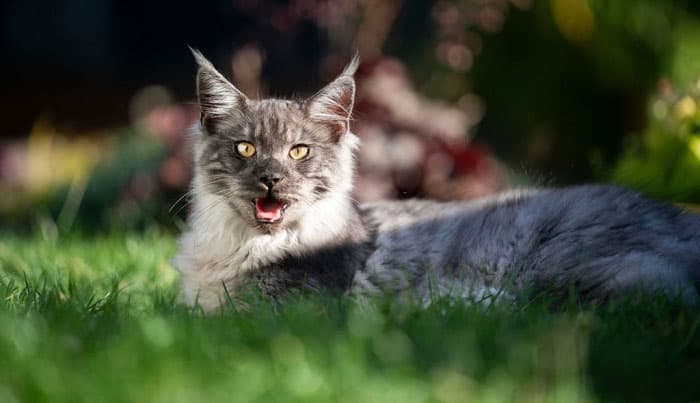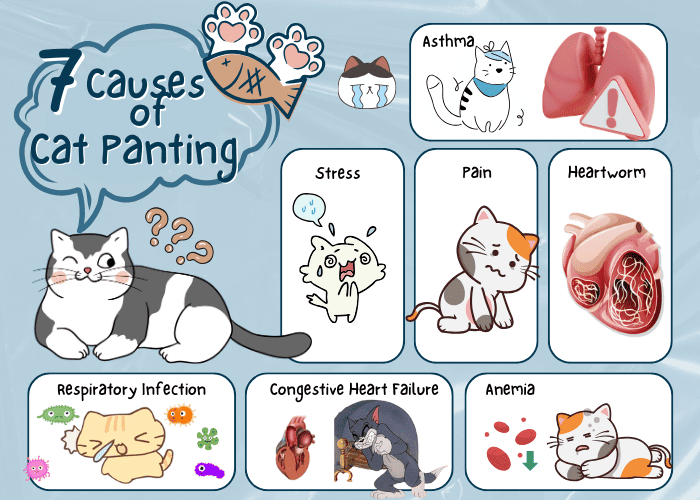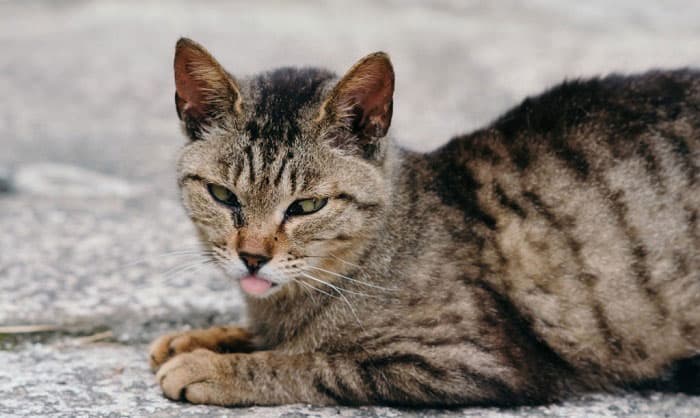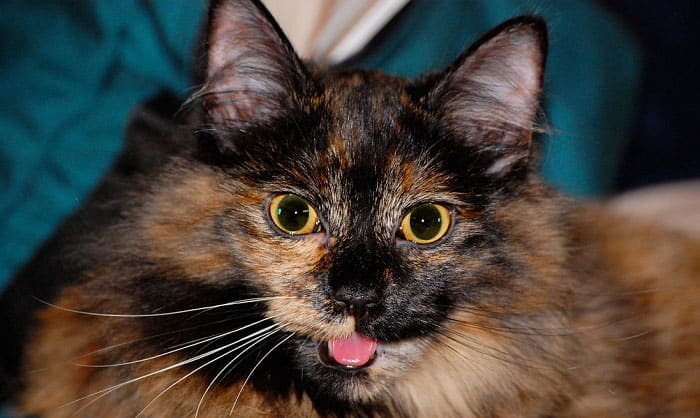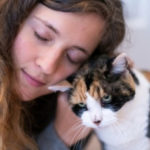Have you ever seen a cat breathing with mouth open? Although it is absolutely normal for a dog to stick its tongue out and breathe heavily, seeing a cat panting with mouth open is something uncommon.
If you’ve noticed this happening with your cat, I believe it always follows the question of “Why is my cat panting?”, and “Is it concerning to see my cat panting with tongue out like that?”.
Generally speaking, it depends on the causes to determine if your kitten panting is something you should worry about. Normally, your cat would pant to release heat when the temperature is too high, anxious, or stressed.
Besides the reasons, I’ll talk about what you can do to deal with this phenomenon. Without further ado, let’s get started with the first section!
Table of Contents
7 Causes of Cat Panting That You Should Watch Out for
If your cat is not too warm or tired after heavy exercise but he/she stills pants noticeably, there is probably something going on with your cat. My best advice in this situation is to call the vet so your cat can be taken care of as soon as possible.
1. Asthma
Asthma is an inflammatory disease in which the lungs swell and are narrower than usual. Consequently, the patient’s lung capacity will be lower than a normal person’s, which leads to breathing difficulties.
Just like asthma in humans, there are various factors that can trigger asthma in cats. Moreover, when a cat breathes in allergens, they will trigger the cat’s immune system, making it more difficult for oxygen to flow to the lungs, which then, result in swelling and irritation in the airways.
Some symptoms of asthma include extreme wheezing, coughing, heavy breathing, and increasing respiratory rates. Specifically for cats, they might be squatting and extending their necks for more air.
Additionally, the cats’ lips can turn blue as oxygen can’t be transported through the body. Treatment for asthma will involve medications, such as bronchodilators or corticosteroids.
2. Heartworm
Heartworms are tiny parasites that infect your cat’s lungs severely. The illness related to heartworms is called the Heartworm Associated Respiratory Disease, which leads to a shortage of breath, coughing, panting, and wheezing.
What makes this disease different from asthma is that your cat’s health deteriorates at a faster rate. Some other symptoms include the lack of appetite, lethargy, or serious respiratory distress.
3. Respiratory Infection
Infection in the respiratory system can be a possible reason why your cat finds great difficulties in breathing. However, this is an extremely common cause for cats panting. It is also known as the cat flu.
Cat flu is when there is an upper respiratory infection, resulting from bacterias and viruses occuring in cats. In addition, this can happen to cats of all breeds and ages. Despite not being so serious, it is advised that you take your cat to the vet for better diagnosis.
Furthermore, if your cat’s nose has some kind of blockage, they will probably use their mouth to breathe. Yet, it is an unusual phenomenon that you should watch out for. Take your cat to the vet so the blockage can be removed.
4. Congestive Heart Failure
The fourth cause I’d like to mention in this article is the effect of congestive heart failure. What is troublesome with this is that health issues related to the heart often go unnoticed. The signs of heart problems vary depending on the seriousness of the condition.
For instance, cardiomyopathy is a popular genetic condition in cats that is related to the structure of the cat’s heart muscle. Moreover, there are certain types of cats that are more prone to this disease, such as ragdoll, maine coon, sphynx, British shorthair, etc.
In addition, heart-related issues are more likely to happen in elderly cats than kittens. Thus, if you notice your elderly cat panting regularly, it might be best to take them to the vet for examination and treatment.
5. Stress
Being in constant stress might be a factor that affects your cat breathing function as well. Different cats respond to trauma and stress in various ways. However, some of them are shaking, hiding, panting, etc.
These symptoms can be removed along with the triggering factor. However, if the experience aggravates, your cat might need some special assistance from the professionals.
6. Anemia
The second last reason why your cat is panting is anemia, a condition in which there is an insufficient amount of red blood cells to carry oxygen through the body. Consequently, your cat becomes tired very easily, which leads to panting as a way to take in more oxygen.
Regarding the treatment, it depends on your cat’s condition whether conducting medical procedures or giving supplements is enough. Once again, consult the veterinarian to figure out the most suitable treatment for your feline friend.
7. Pain
Cats are extraordinarily good at hiding their own pain, but panting is a signal that your cat might be suffering from some injuries. In addition to panting, aggressive behavior or changes in their eating habits can be something you notice.
The Normal Panting in Cats
As you can imagine, your kitten will likely open its mouth and have its tongue out partially while panting. Furthermore, their breaths will be shorter and more frequent. Usually, they will be laying down while panting as well.
It is totally normal if your cats do this while the weather is extremely hot. Just like dogs, this is a way for your cat to release the heat. In this case, you can sort it out by giving your cat more water to drink and turning on some fans or air conditioners to lower the temperature in your house.
Once they have cooled down, your cats will stop panting. Yet, if you are not sure whether this is the case, ask for advice from the veterinarian.
What Should You Do in This Situation?
There are several ways to deal with your cat’s panting. If your cat happens to pant right after a long time of playing and running around, there is a high chance that your pet only needs some time to rest to recover.
When your cat is triggered by some environmental factors, such as loud noises, simply place your cat in a quiet room and give it some time to calm down. Eventually, your cat will stop panting.
However, if this is not the case and you suspect that your cat is having health issues, going to the vet is the ultimate solution. If you are not able to arrive at the vet, you might call them to ask for some instructions on what to do until you can bring your cat there. Also, check out this video to learn more.
Conclusion
So, why is my cat panting? There are multiple reasons to explain this phenomenon. While some of them are quite normal and harmless to your cats, many are dangerous and require immediate help from the vet.
I hope this article has provided you with the information that you need. Let me know what you think in the comment section. If you find this article helpful, share it with your friends and family as well.

I am Amy Sawy, a Doctor of Veterinary Medicine (DVM) graduate from the University of Kansas. y husband, Dr. Plummer, and I own a veterinary clinic in Phillipsburg, Kansas. In addition to my professional background, I am a devoted pet owner myself, with a household that includes dogs, rodents, and most notably, cats – a total of five felines in my home.
In 2020, I joined an organization as a professional writer, leveraging my experience and collaborating with my team to deliver the most valuable information for your cat’s care.


